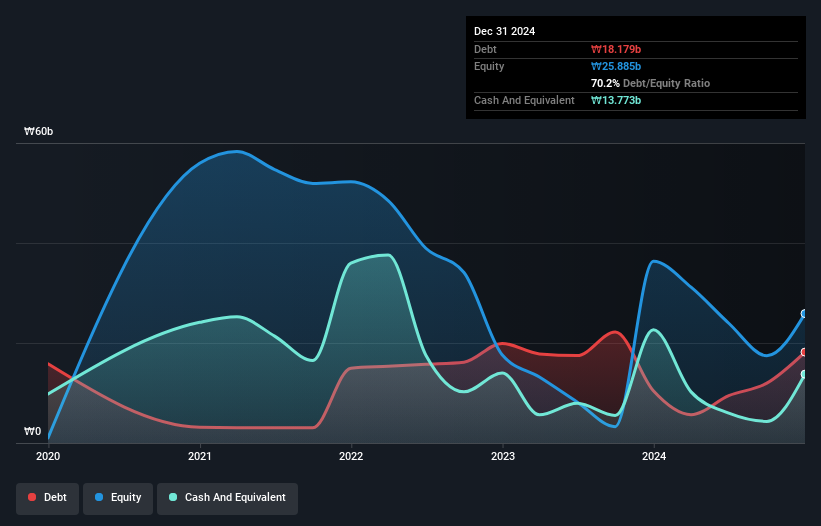- South Korea
- /
- Medical Equipment
- /
- KOSDAQ:A214610
Would BioMed (KOSDAQ:214610) Be Better Off With Less Debt?
The external fund manager backed by Berkshire Hathaway's Charlie Munger, Li Lu, makes no bones about it when he says 'The biggest investment risk is not the volatility of prices, but whether you will suffer a permanent loss of capital.' So it might be obvious that you need to consider debt, when you think about how risky any given stock is, because too much debt can sink a company. We note that THE BioMed Co., Ltd. (KOSDAQ:214610) does have debt on its balance sheet. But the real question is whether this debt is making the company risky.
When Is Debt Dangerous?
Debt is a tool to help businesses grow, but if a business is incapable of paying off its lenders, then it exists at their mercy. In the worst case scenario, a company can go bankrupt if it cannot pay its creditors. However, a more common (but still painful) scenario is that it has to raise new equity capital at a low price, thus permanently diluting shareholders. By replacing dilution, though, debt can be an extremely good tool for businesses that need capital to invest in growth at high rates of return. When we think about a company's use of debt, we first look at cash and debt together.
How Much Debt Does BioMed Carry?
The image below, which you can click on for greater detail, shows that at December 2024 BioMed had debt of ₩18.2b, up from ₩10.4b in one year. However, it does have ₩13.8b in cash offsetting this, leading to net debt of about ₩4.41b.

How Strong Is BioMed's Balance Sheet?
According to the last reported balance sheet, BioMed had liabilities of ₩13.6b due within 12 months, and liabilities of ₩14.9b due beyond 12 months. Offsetting these obligations, it had cash of ₩13.8b as well as receivables valued at ₩2.59b due within 12 months. So its liabilities outweigh the sum of its cash and (near-term) receivables by ₩12.2b.
This deficit isn't so bad because BioMed is worth ₩26.5b, and thus could probably raise enough capital to shore up its balance sheet, if the need arose. However, it is still worthwhile taking a close look at its ability to pay off debt. When analysing debt levels, the balance sheet is the obvious place to start. But it is BioMed's earnings that will influence how the balance sheet holds up in the future. So if you're keen to discover more about its earnings, it might be worth checking out this graph of its long term earnings trend.
See our latest analysis for BioMed
Over 12 months, BioMed made a loss at the EBIT level, and saw its revenue drop to ₩4.6b, which is a fall of 14%. That's not what we would hope to see.
Caveat Emptor
While BioMed's falling revenue is about as heartwarming as a wet blanket, arguably its earnings before interest and tax (EBIT) loss is even less appealing. Indeed, it lost a very considerable ₩22b at the EBIT level. Considering that alongside the liabilities mentioned above does not give us much confidence that company should be using so much debt. So we think its balance sheet is a little strained, though not beyond repair. However, it doesn't help that it burned through ₩11b of cash over the last year. So in short it's a really risky stock. When analysing debt levels, the balance sheet is the obvious place to start. But ultimately, every company can contain risks that exist outside of the balance sheet. For instance, we've identified 5 warning signs for BioMed (2 can't be ignored) you should be aware of.
At the end of the day, it's often better to focus on companies that are free from net debt. You can access our special list of such companies (all with a track record of profit growth). It's free.
New: AI Stock Screener & Alerts
Our new AI Stock Screener scans the market every day to uncover opportunities.
• Dividend Powerhouses (3%+ Yield)
• Undervalued Small Caps with Insider Buying
• High growth Tech and AI Companies
Or build your own from over 50 metrics.
Have feedback on this article? Concerned about the content? Get in touch with us directly. Alternatively, email editorial-team (at) simplywallst.com.
This article by Simply Wall St is general in nature. We provide commentary based on historical data and analyst forecasts only using an unbiased methodology and our articles are not intended to be financial advice. It does not constitute a recommendation to buy or sell any stock, and does not take account of your objectives, or your financial situation. We aim to bring you long-term focused analysis driven by fundamental data. Note that our analysis may not factor in the latest price-sensitive company announcements or qualitative material. Simply Wall St has no position in any stocks mentioned.
About KOSDAQ:A214610
RollingStone
Provides point-of-care-testing diagnostic systems based on Lab-on-a-Chip technology.
Excellent balance sheet with moderate risk.
Market Insights
Community Narratives



